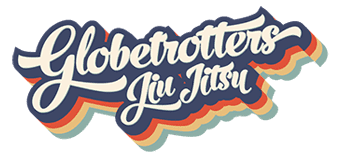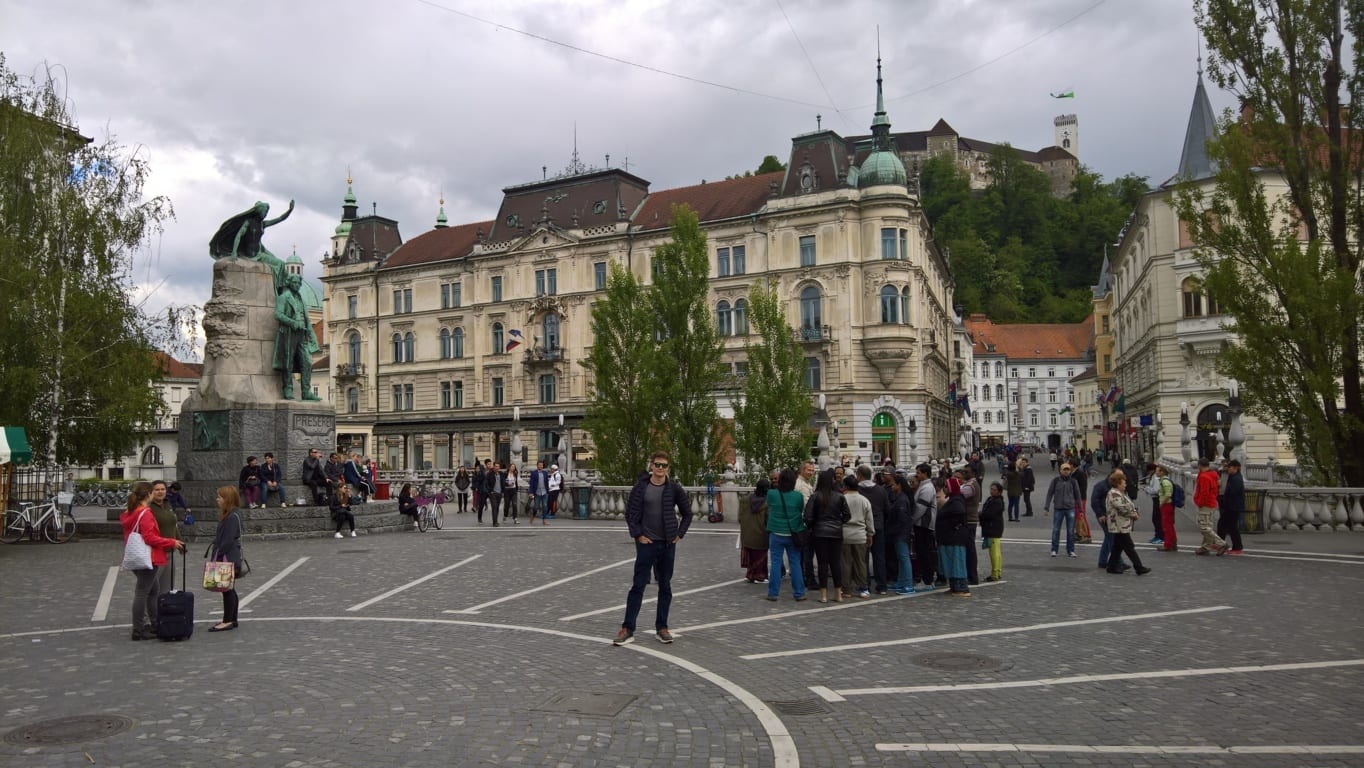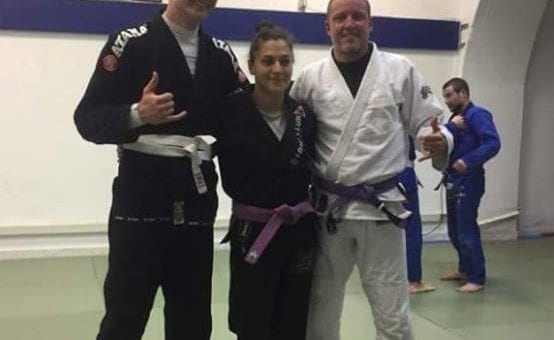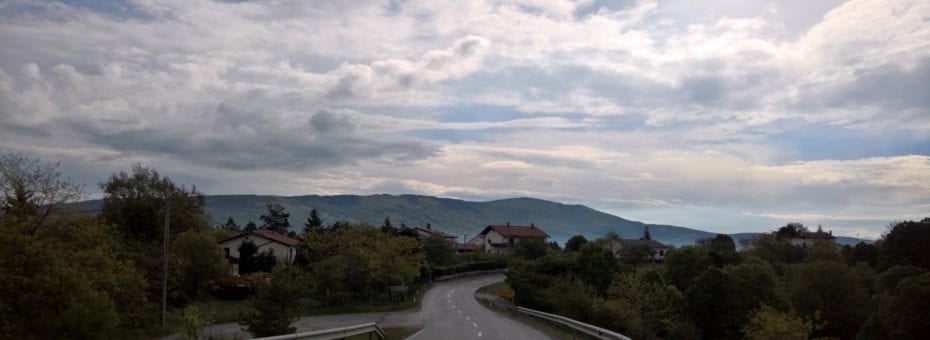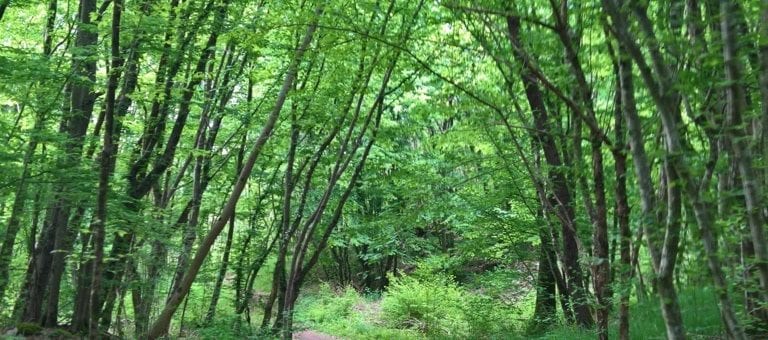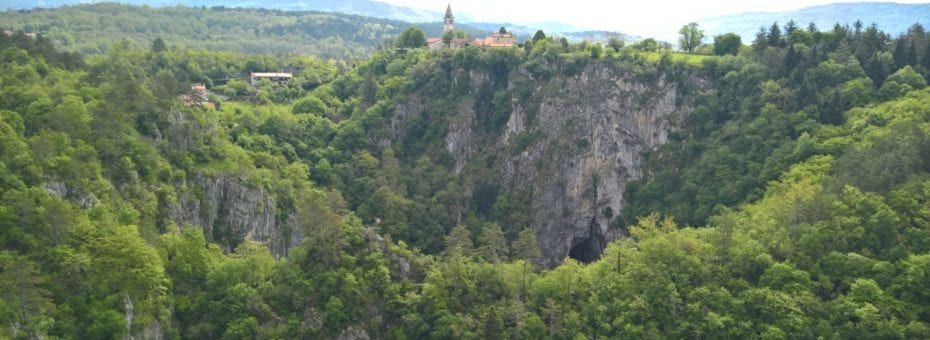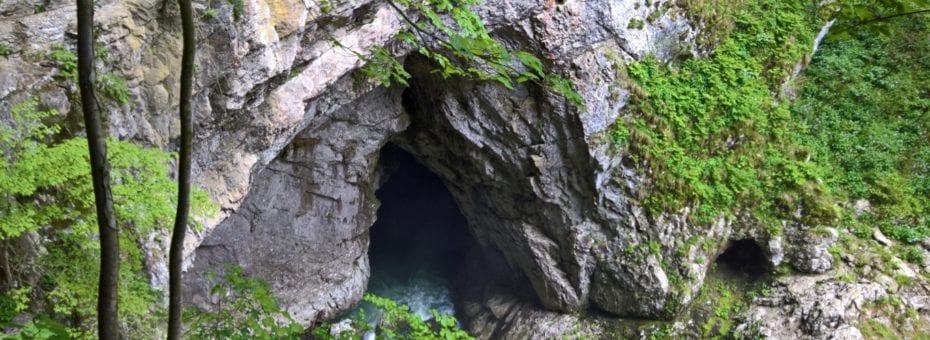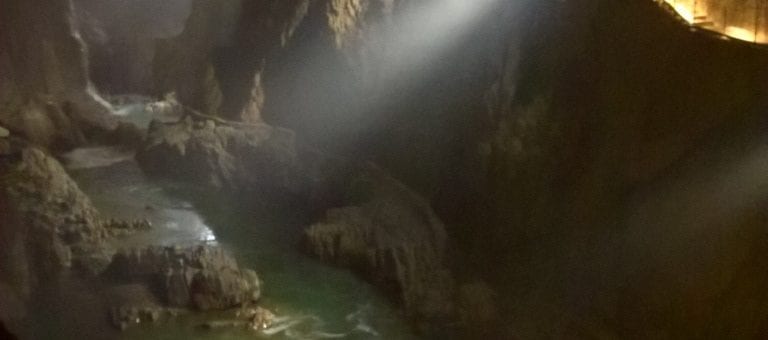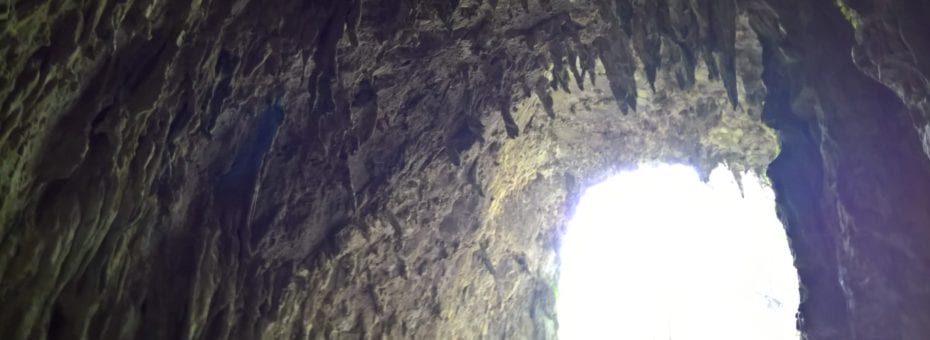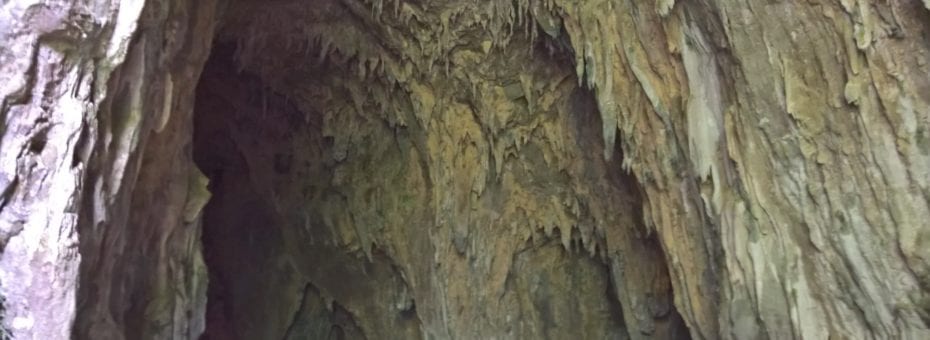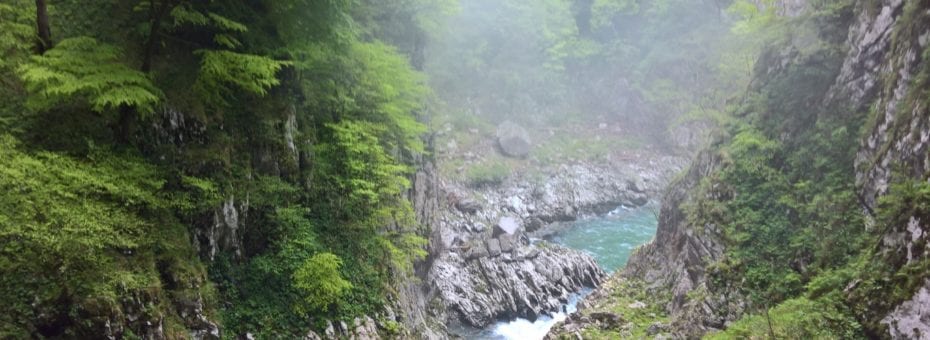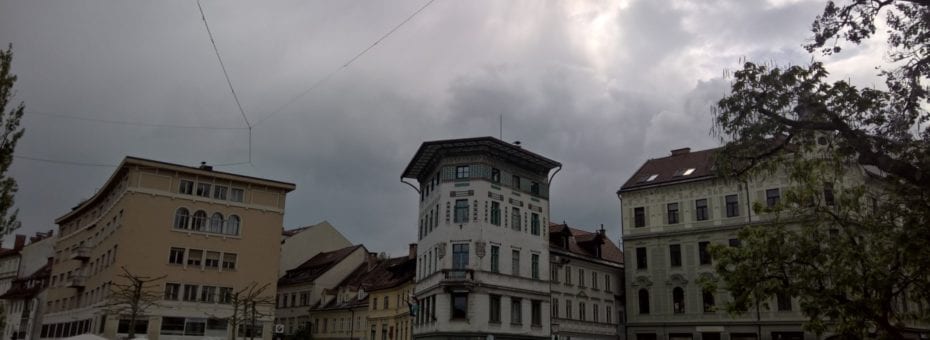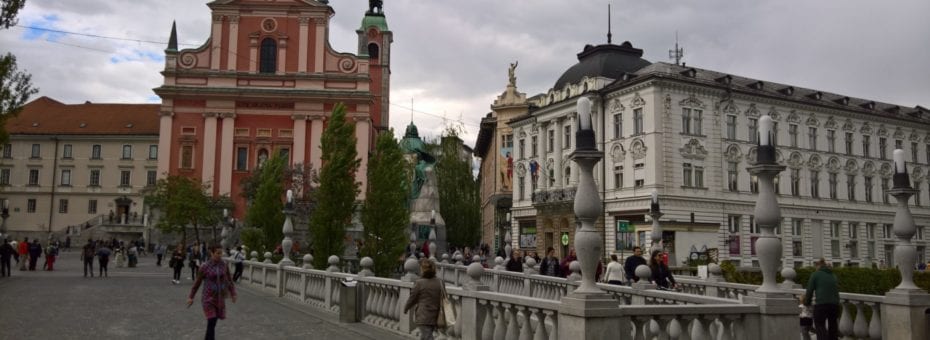Tap waters and underground rivers
“Is it ok to drink the tap-water here?”
“Yes, of course it is,’ replied Emma, the imposing Croatian purple-belt who ran the session, ‘the water here is the best in all the Balkans!’ Paradoxically, I would hear this statement in most gyms and hostels I visited across the region.
Whilst I cannot honestly assess whether or not Croatian water was that water I’d always been searching for, I can say that the training session at the Lotus BJJ academy in Rijeka was just what I wanted: intense, diverse (in people’s’ skills) and, most of all, extremely welcoming. Just like with the arms race on water, Balkan states seem locked in an upward spiral of generosity. The deeper I go into former Yugoslavia, the more friendly and warm the people seem. The handshakes at the end of the session said it all. Maybe in this part of the world people shake hands more strongly, but with those beaming Croatian smiles in their eyes and the firm grasp and clasp, it felt as if we’d been there for days, not the hour and a half we had actually spent there.
Myself, Milos and Taja, another member of the club, had popped over for a day-trip to Rijeka from Koper, as it’s only about a two hour drive. After the session we wandered a bit around the port and then sat ourselves down at a seafront restaurant, where I proceeded to stuff my face with some of the best calamari and polenta I’d ever trained for. On the way back we stopped for another drink in Opatia, a seaside resort-town that Milos assures me was “the Monte Carlo of Yugoslavia” back in the day. The fancy bars, Mediterranean vibe and ubiquitous gambling venues echo his statement. Although my phone was dead and I have no photos, picture a night-time coast folding into a corner (Rijeka and Opatia are on the corner where the central Croatian coastline meets the heart-shaped bulge of Istria) littered with the lights of several Croatian towns. Milos informs me that, across the sparkling sea, one of the islands is infamous for having been the prison for Tito’s political prisoners.
There are people out tonight, but it’s still quiet: the summer onslaught of Brits getting shitfaced and asking where exactly the scenes from Game of Thrones were filmed is yet to begin; Croatian people can still enjoy their coastline in some peace, for now.
On the way back, due to Milos’ excellent navigation skills and a fog drifting over Istria, we took a very long route back to Koper. I think I was the only one in the car who was grateful, pressing my face against the window and staring out into the eery Karst landscape and wondering why I didn’t bring my charger with me.
—
The next day we have one more training session, in Koper (this time with a good turnout of around 10 people; barbecue weather had just ended). The following day we’d all be departing Koper to go briefly to Ljubljana and Zagreb, to train at Bojan Mirkovich’s academy, Milos’ instructor. At night I puttered about, took a long walk and made my goodbyes to the old place. Despite the awkward sleeping conditions and the initial cold, I had enjoyed living like a monk, on the floor, next to the training area. I hope I get to do it again.
My plan for the departure day was to set off earlier, by bus, and stop to see the Skoncja Caves near Divaca. The Karst region of western Slovenia is built of long stretches of limestone, perfect for the formation of cave-systems. Postojna is the typical tourist destination, being so large that it can accommodate a inner train system, but given its steep €30 fee, I decided to go for the half-the-price, smaller cousin at Skoncja, and hoping not to be disappointed. I wasn’t.
After I dropped off the coach at Divaca I asked some of the locals, in a mixture of pidgin English and improvised sign-language, where to go for the caves. Eventually, after frantically pacing around some roads I found the pathway leading to the caves (marked by tiny, discoloured signposts the size of my foot. As I passed the last village and went into the forest behind I encountered more and more reassuring signposts. Although the signs were about 500 metres apart from each other, they all repeated: “Skoncja Caves – 15 minutes”, as though it remained eternally distant, no matter the effort I made. I smell lazy signposting.
As I’m walking through the glade I hear a faint stream. Nope, it’s probably a small river actually. Ok, maybe a middle-size one … with a small waterfall. A few seconds later, there’s a clearing in the woods and …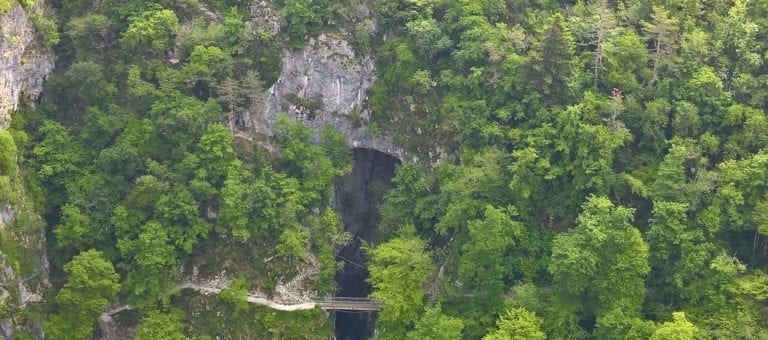
… I find it. The first part of the cave system. This massive eye-gouge in the Earth was initially part of the caves, until it collapsed in the 19th century and opened up the caves to Austro-Italian explorers. Checking my maps I can see that the cluster of houses (the term “village” feels a bit too permanent for this dangerously placed location) is indeed, Skoncja. I skip along and find the tourist centre, naturally filling with people, and get onto the first tour.
Unfortunately most of the tour was photography-restricted, so I had to take a lot of photos on the sly, and most of them turned out, well … shit. Except for this one, which doesn’t convey half the wonder and amazement I felt being inside this gateway to hell:
The picture above was of only one of the caverns. All in all, the cave was large enough to swallow a block of flats, at least 100 metres in height, complete with a “Bridge of Moria” style path across a narrow ravine placed across a raging stream. My sense of wonder actually managed to overcome my fear of heights and I peered over, into the abyss where sharp rocks had claimed several explorers a century ago.
I get picked up by Milos and Taja back in Divaca. Along the road, we discuss the Slovenian economy (not a cheery topic, I’m afraid) and we engaged in the time-honoured tradition of exchanging swear words in each other’s languages. On that note, I was pleased to find out we had some in common, between Romanian and Slovenian. On the downside, it does explain why I got some indignant stares from old ladies in a bus stop when I cursed a vending machine that wouldn’t give me change. Oops.
We went briefly to Ljubljana, but we only had time for half an hour, so we sauntered a bit about the city centre and had a coffee.
We hadn’t suffered a delay at the border yet and that day our luck ran out. We were stuck for some time. I’ll spare the details of crossing the border, but here are some bullet points from my notebook (bear in mind these are the inner ramblings of a tired, thirsty traveller awaiting sunstroke while his door window can’t open):
- there’s a chance we might miss training; the line is long. I’m staring at my passport photo and realizing that one of my eyes is off center and it shows, somewhat.
- I wonder how the geography here affected the isolation of villages in the area …
- I have some postcards for my grandparents that I forgot to send. They’re from … Avignon, France, feck. I’m a terrible grandson.
- Why are they still playing Tina Turner on the radio??
- And we’re through!!
We made it to training in outer Zagreb just in time … to be half an hour late. No matter, we warm up quickly, shake hands (again, firm and friendly clasps) with all and with the black-belt, Bojan. He’s a smiling mountain of a man. He shouts and starts the long rounds of drilling that last till the end of training. Our starting position is standing-guard, alternating who gets to begin in reverse piggy-back. Being fresh, we start alright, even someone who is as much of a novice to gi as me. But stamina wears down quickly with this one, and the several times that Bojan himself jumped onto my hips gave me a slight feeling of dread. No matter, for that finished quickly every time when he manacled my limbs and lapels into discomfort I hadn’t yet experienced. This was definitely a step-up in skill from the previous gyms, and I learned even more from those exhausting rounds.
Then came my favourite part of the evening. After a satisfying training session we’re all queuing for the showers. I have four times the luggage of anyone, since I have two backpacks and my gi-bag, and Milos asks around if anyone can help me find my hostel. You’d think that tired, busy Croatians would reply with some sloth, but no. When that question rang out, a forest of naked Croatian men jumped on me, demanding:
“Where is your hostel? Do you know the tram system?”
“What’s the address? Have you been here before?”
“It’s free after a certain hour, I’m pretty sure-”
“What?! Haha, don’t listen to this guy, it’s cheap anyway, you can buy from the driver …”
in quick succession. All this time I’m frantically trying to answer their questions and find the damn email with the address in my inbox. And clutching at my shower items.
One of the guys, a friendly, bearded purple-belt, offers to take me to tram stop and waits for me to finish showering. I’ve forgotten his name and only remember that he was a petroleum engineer (to you, good sir, hvala!). He walks me over, inquiring about my travels and telling me about the club. When we get to the stop he assures himself that I know which stop I have to get off at.
He asks me if I have enough kunas (I needed 4). As I begin to fumble around my pocket, I don’t have two seconds before he shoots his hand into his wallet and produces a 5 kuna coin. before my dumbstruck mouth even manages to articulate “Oh … plea-”, he shoves it into my hand and tells me not to worry.
We had dinner with Bojan and a friend of his at a damn good Bosnian restaurant in the area. I don’t wish for other globetrotters to come and exploit local generosity, but I have to state, with full gratefulness, that Bojan paid the bill, for his friends and included me as well. By this point in my travels my ability to absorb hospitality was rendering me stupid. Later on I sat on the tram and felt annoyed that 9 years of living in Britain had rendered me incapable of not feeling awkward and flabbergasted at these gestures. Such warm people-
-And even then, the Balkan spirit would not leave me alone: as it became obvious that I was confused about where I had to go and pay on the tram, a complete stranger came over and helped me direct my kunas in the right direction. That was generosity’s way of signing its name and saying “Welcome to Zagreb”. It’s too much I thought, I’m happily going to my hostel to collapse right now. I’ll write next about Zagreb and why it’s so beautiful, and, most importantly, about the people here.
